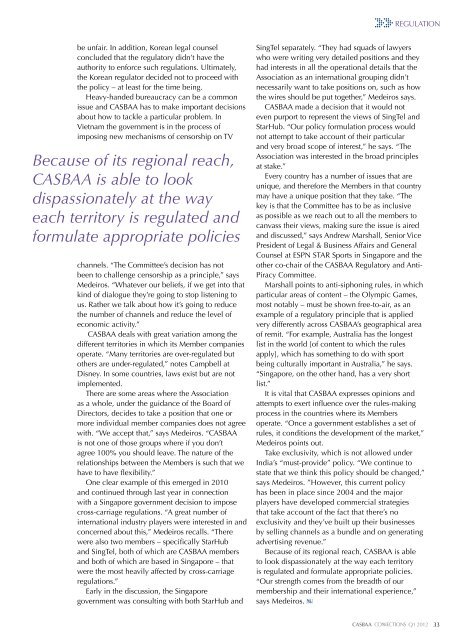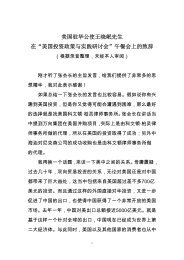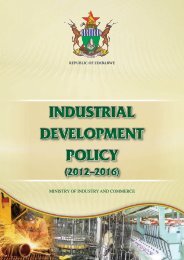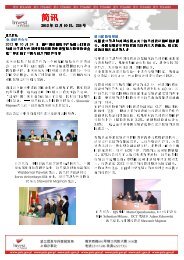Read More - Chinagoabroad
Read More - Chinagoabroad
Read More - Chinagoabroad
You also want an ePaper? Increase the reach of your titles
YUMPU automatically turns print PDFs into web optimized ePapers that Google loves.
e unfair. In addition, Korean legal counsel<br />
concluded that the regulatory didn’t have the<br />
authority to enforce such regulations. Ultimately,<br />
the Korean regulator decided not to proceed with<br />
the policy – at least for the time being.<br />
Heavy-handed bureaucracy can be a common<br />
issue and CASBAA has to make important decisions<br />
about how to tackle a particular problem. In<br />
Vietnam the government is in the process of<br />
imposing new mechanisms of censorship on TV<br />
Because of its regional reach,<br />
CASBAA is able to look<br />
dispassionately at the way<br />
each territory is regulated and<br />
formulate appropriate policies<br />
channels. “The Committee’s decision has not<br />
been to challenge censorship as a principle,” says<br />
Medeiros. “Whatever our beliefs, if we get into that<br />
kind of dialogue they’re going to stop listening to<br />
us. Rather we talk about how it’s going to reduce<br />
the number of channels and reduce the level of<br />
economic activity.”<br />
CASBAA deals with great variation among the<br />
different territories in which its Member companies<br />
operate. “Many territories are over-regulated but<br />
others are under-regulated,” notes Campbell at<br />
Disney. In some countries, laws exist but are not<br />
implemented.<br />
There are some areas where the Association<br />
as a whole, under the guidance of the Board of<br />
Directors, decides to take a position that one or<br />
more individual member companies does not agree<br />
with. “We accept that,” says Medeiros. “CASBAA<br />
is not one of those groups where if you don’t<br />
agree 100% you should leave. The nature of the<br />
relationships between the Members is such that we<br />
have to have flexibility.”<br />
One clear example of this emerged in 2010<br />
and continued through last year in connection<br />
with a Singapore government decision to impose<br />
cross-carriage regulations. “A great number of<br />
international industry players were interested in and<br />
concerned about this,” Medeiros recalls. “There<br />
were also two members – specifically StarHub<br />
and SingTel, both of which are CASBAA members<br />
and both of which are based in Singapore – that<br />
were the most heavily affected by cross-carriage<br />
regulations.”<br />
Early in the discussion, the Singapore<br />
government was consulting with both StarHub and<br />
REGULATION<br />
SingTel separately. “They had squads of lawyers<br />
who were writing very detailed positions and they<br />
had interests in all the operational details that the<br />
Association as an international grouping didn’t<br />
necessarily want to take positions on, such as how<br />
the wires should be put together,” Medeiros says.<br />
CASBAA made a decision that it would not<br />
even purport to represent the views of SingTel and<br />
StarHub. “Our policy formulation process would<br />
not attempt to take account of their particular<br />
and very broad scope of interest,” he says. “The<br />
Association was interested in the broad principles<br />
at stake.”<br />
Every country has a number of issues that are<br />
unique, and therefore the Members in that country<br />
may have a unique position that they take. “The<br />
key is that the Committee has to be as inclusive<br />
as possible as we reach out to all the members to<br />
canvass their views, making sure the issue is aired<br />
and discussed,” says Andrew Marshall, Senior Vice<br />
President of Legal & Business Affairs and General<br />
Counsel at ESPN STAR Sports in Singapore and the<br />
other co-chair of the CASBAA Regulatory and Anti-<br />
Piracy Committee.<br />
Marshall points to anti-siphoning rules, in which<br />
particular areas of content – the Olympic Games,<br />
most notably – must be shown free-to-air, as an<br />
example of a regulatory principle that is applied<br />
very differently across CASBAA’s geographical area<br />
of remit. “For example, Australia has the longest<br />
list in the world [of content to which the rules<br />
apply], which has something to do with sport<br />
being culturally important in Australia,” he says.<br />
“Singapore, on the other hand, has a very short<br />
list.”<br />
It is vital that CASBAA expresses opinions and<br />
attempts to exert influence over the rules-making<br />
process in the countries where its Members<br />
operate. “Once a government establishes a set of<br />
rules, it conditions the development of the market,”<br />
Medeiros points out.<br />
Take exclusivity, which is not allowed under<br />
India’s “must-provide” policy. “We continue to<br />
state that we think this policy should be changed,”<br />
says Medeiros. ”However, this current policy<br />
has been in place since 2004 and the major<br />
players have developed commercial strategies<br />
that take account of the fact that there’s no<br />
exclusivity and they’ve built up their businesses<br />
by selling channels as a bundle and on generating<br />
advertising revenue.”<br />
Because of its regional reach, CASBAA is able<br />
to look dispassionately at the way each territory<br />
is regulated and formulate appropriate policies.<br />
“Our strength comes from the breadth of our<br />
membership and their international experience,”<br />
says Medeiros.<br />
CASbAA Q1 2012 33










